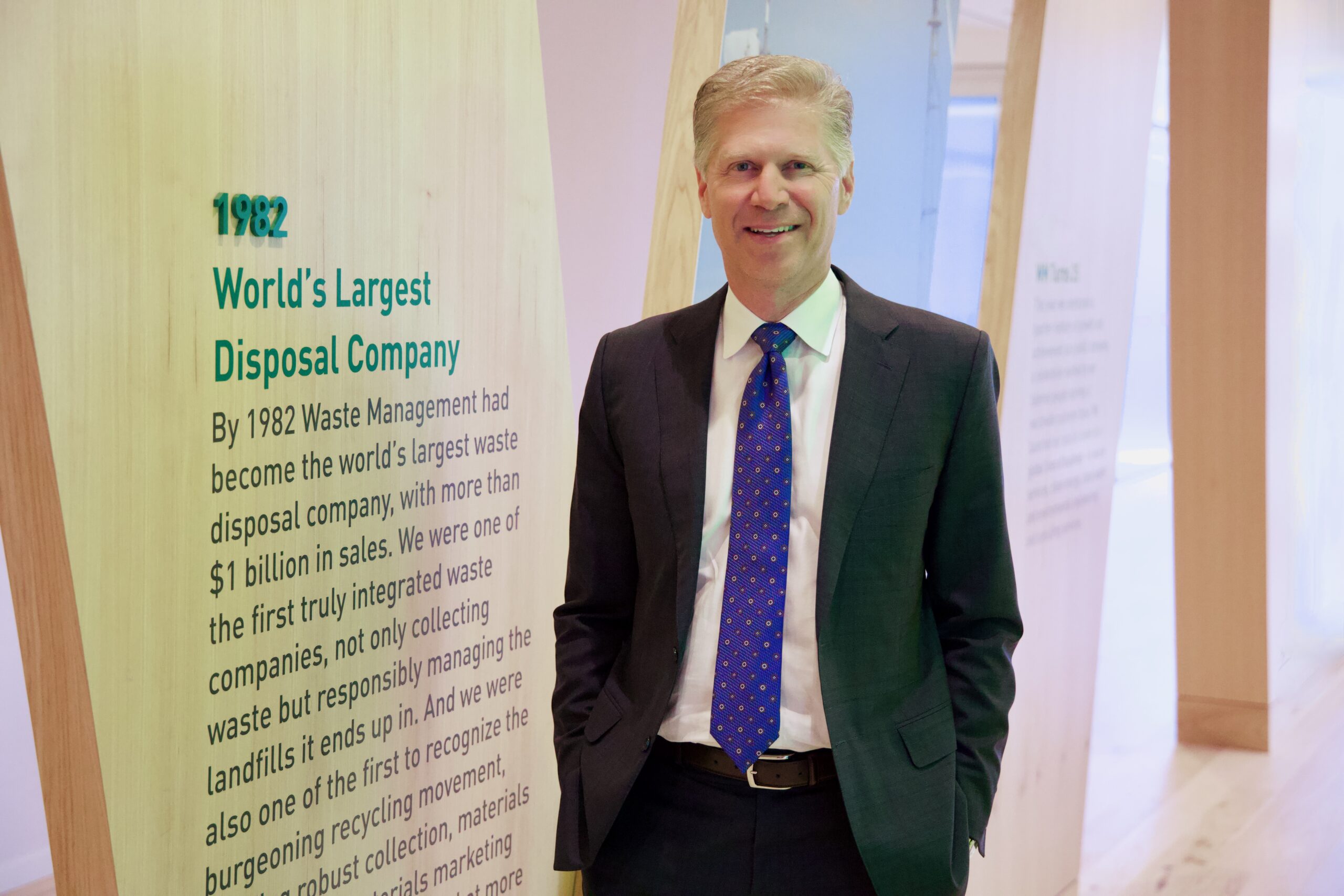Any deal involving $7.2 billion is likely to be a complicated transaction. But Waste Management’s acquisition of Stericycle was singularly complex.
Though both are in the waste management business, their markets are demonstrably different. Waste Management is a $20 billion per year, publicly traded solid waste and recycling business headquartered in Houston. Stericycle was a $2.6 billion publicly traded, compliance-driven company specializing in the highly regulated field of medical waste disposal.
And by the time their deal was finalized in November 2024, it had become a courtship that took several looks over several years, outdistancing a pricing class action, an ongoing investigation involving the Foreign Corrupt Practices Act, a shrinking target and the integration of a massive parent company into what amounted to an entirely new path promising medical-grade ordinance and the enticing possibilities for growth.
From beginning to end, WM’s chief legal officer, Charles Boettcher, was part of the strategic conversations, the transaction evaluations and — along with outside counsel Vinson & Elkins — the final execution of one of the most interesting and significant deals of 2024.
“[We] looked at Stericycle several times in the past,” says Boettcher. “I personally had been involved in two of those serious looks prior to this last one. During the prior two, I was not as favorable toward the acquisition.”

In the first case, a class action against Stericycle accused the company of imposing automated price increases on certain customers. In the second, there was an open federal investigation into Stericycle on accusations of bribery in several Latin American countries, for which the company ultimately resolved by paying an $84 million settlement with the U.S. Department of Justice.
By the time of the third look, says Boettcher, circumstances had changed, both legally and economically.
“Stericycle had favorably-resolved the pricing class action and made significant changes to its contracting processes — that passed the test of a monitor who was charged with overseeing the pricing practices following the (class-action) settlement — and had resolved the FCPA matter with a deferred prosecution agreement and monitorship that we knew was coming to an end and which was just recently terminated.”
Moreover, the metrics of a potential deal had changed significantly. Stericycle had sold off its international operations and non-core businesses, contracting itself substantially. Waste Management, on the other hand, had grown to more than 10 times the size of Stericycle.
“This meant that an acquisition of what remained as Stericyle would be much cleaner to integrate and operate and would be much less of a ‘bet the company’ move for us,” says Boettcher. “As such, it felt like the right time to acquire the leading company in North America for regulated medical waste and shredding services.”
Boettcher joined Waste Management in 2016 and has been an in-house counsel since 2007. In nearly 18 years, he’s seen the role of chief legal officer morph from tactical to strategic.
“There is a huge business need for legal advisors to be part of all aspects of the business — to navigate an increasingly complex regulatory environment and other legal risks, in a manner that is focused on helping the business realize its full potential in any environment. A capable chief legal officer is invaluable in strategic planning and helping the business execute on the strategic plan,” Boettcher says.
And there may be no better illustration of that change in philosophy than his own role in the Stericycle transaction.
“I played a central role in the transaction from start to finish,” Boettcher says. “I was part of a small group on the executive team who oversaw the transaction, weighing-in on valuation and negotiations as well as guiding the legal aspects of the transaction, including due diligence under an accelerated timeframe, as is common in public company transactions.”
As a result, Waste Management’s acquisition of Stericycle is one of two finalists for the 2025 Houston Corporate Counsel Award for M&A Transaction of the Year. The award will be presented by the Association of Corporate Counsel’s Houston Chapter and The Texas Lawbook today at the Four Seasons in Houston.
Not even his favorite
Complicated as it was, the Stericycle transaction wasn’t as nerve-wracking as WM’s $4.6 million purchase of Florida-based Advanced Disposal Services.
The ADS deal, first announced at a $4.9 billion price tag in April 2019, had a lot going against it. First, since the nation’s largest solid waste disposal firm was buying the nation’s fourth largest solid waste disposal firm, there was the obvious antitrust issue. That issue was resolved by the two companies agreeing to sell off a combined $835 million in assets to a Canadian corporation. Then the closing, scheduled for Spring 2020, was delayed by the coronavirus pandemic and the attendant market shock. Finally, the deal closed in June 2020 at the reduced $4.6 billion price.
Boettcher describes that final day as his favorite at Waste Management “on account of the fact that we did so while successfully holding onto a favorable valuation for our DOJ-required and other divestitures in connection with that acquisition and assisting the business to navigate COVID-19 and debt market issues connected with the closing of the transaction.”
Boettcher isn’t a native-born Texan. He was born in Grand Forks, North Dakota, where his father was stationed by the U.S. Air Force. He grew up in the other Dakota: Watertown, South Dakota, where ancestors on both sides of his family had settled over the years. None were lawyers.
“My mom’s extended family are farmers. My dad’s family are city-folk,” Boettcher explains. “My dad — and mom later in life — was a window salesperson and, together, they owned and operated a wholesale window business.”

As he describes it, Boettcher was already on a path toward the legal profession by the time he hit high school, where he was involved in student politics and debate competitions. He graduated cum laude in business administration and accounting from the University of South Dakota in 1996 and magna cum laude from Texas Tech School of Law in 1999.
While he clerked for several firms in Dallas, Austin and Lubbock, it was a stint at Thomson & Knight that caught his attention.
“Choosing Thompson & Knight in Dallas was one of the best decisions I ever made,” he said, “Though we worked hard and delivered excellent client-service at all times, the culture was more family-oriented than other big law firms.”
While at Thompson & Knight, one of Boettcher advised Natural Gas Partners, a Dallas-based private equity firm, on many of its transactions. As the result of a combination transaction between one of its portfolio companies, Eagle Rock Energy, Joe White became CEO of Eagle Rock and asked Boettcher to join him in-house as general counsel. NGP, aware of his skillset, gave their approval.
An eight-year turn at Eagle Rock ended with a sale of the company and he immediately followed that at another NGP portfolio company, Oilfield Water Logistics, as CFO and general counsel.
“I had several mentors in my career (both at Eagle Rock and Thompson & Knight) who recognized strengths in me that they believed would be well-suited to a much larger public-company platform,” says Boettcher.
Two outside board members at Eagle Rock, in particular, encouraged him to stay open to opportunities at much larger companies outside the NGP network. Boettcher said he took the job at Oilfield Water with the understanding that he might soon have an opportunity at a publicly traded company. Ten months later, Waste Management came calling.
Leaning on experience
That NGP experience came into play when Boettcher was considering outside counsel for the Stericycle deal. While an energy M&A partner at Vinson & Elkins, Steve Gill had represented Eagle Rock and had earned Boettcher’s trust.
“I had used Steve for many things and knew and trusted the broader team inside V&E,” says Boettcher. “I met new lawyers, like Ron Tenpas, as part of the transaction and certain aspects of diligence. All of them were excellent advisors who helped us analyze the value of the company given several open legal/regulatory matters.”
The choice, he said, was critical.
“The deal was complex on account of [those] open legal/regulatory matters that had to be analyzed by competent inside and outside lawyers, in order to enable WM to form a view of the proper weight these matters should have, as against WM’s view of valuation of Stericycle.”
“In addition, this acquisition represented a significant step-out by WM — into two adjacent businesses that WM historically had only dipped a toe in. As such, it was critical to quickly gain knowledge about the legal/regulatory environment underlying those businesses. WM was fortunate to have a few internal resources who had experience in these areas, but we also relied on outside counsel at Vinson & Elkins,” Boettcher notes.

Now at Skadden, Steve Gill says the importance and complexity of the deal came with an additional factor: risk.
“This was a tremendous deal for WM and was something they studied for years before going in,” Gill says. “Medical waste was not something really in their portfolio; and given the expected growth in healthcare, it was very strategic for them.”
“I think the fit was compelling, but it was all about timing and price, especially in a cash deal. WM wanted it but they were tremendously disciplined on the cost and the deal ultimately came together after a long process.”
Gill said Boettcher’s patience and integrity were keys to that process.
“Chuck was a tremendous asset in the board room and at the negotiating table. In both instances, he was forthright and straightforward: and by that I mean he thoroughly educated the board on the issues and at times he had to lay down the law with the counterparty — in his polite midwestern style of course. But I think in both instances, that approach yielded results. The (WM) board had confidence in the deal risks because of Chuck, and we were able to cut through a lot of open legal issues because the other side viewed Chuck as an honest, if tough, broker.”
V&E’s Ron Tenpas, who nominated Boettcher and Waste Management for the ACC award, says Boettcher’s compelling presence was critical, even beyond the boundaries of the board room and negotiating table. His negotiations with regulators were pivotal when dealing with Stericycle’s ongoing legal and regulatory issues.
“As a general matter, Chuck was able to walk into contentious negotiations over highly complicated legal and business issues, isolate what the pain points were, and figure out how to reach a solution that all parties could agree on,” said Tenpas.
“Chuck spent a lot of time understanding these matters and their implications for the business going forward. His ability to understand how those matters might wrap up and to get his colleagues comfortable that the issues were manageable was very important. It is always concerning to hear mention of a government investigation during a transactional negotiation. Chuck had to dig in, get comfortable with, and advise his Board on how these matters could likely be managed to allow the deal to close.”
James Kress, a partner at Baker Botts, was involved in some of the regulatory issues that threatened to upend any deal with Stericycle. Boettcher’s personal involvement, he said, was critical.
“At some point in the process — roughly late summer of 2024 — the antitrust and regulatory clearances became the major remaining obstacles for the transaction to close. Chuck had monitored and participated in that process throughout, but as those issues became the gating issues, Chuck became more directly involved. One call with the DOJ lead lawyer, in particular, stands out where Chuck was an active participant on the call, and I think he really helped clarify the issues for both the DOJ and WM such that we were able to clear the HSR (Hart-Scott-Rodino) review process without additional investigation or delay.”

He also has other, ancillary skills that many consider vital to the lawyer-businessman, according to Gill.
“Given their sponsorship of the Phoenix Open, I think it is a prerequisite to WM leadership that you have to be a good golfer and Chuck is no exception. That’s good, because during the Open they play in the Pro-Am and the fans on the 16th hole will give it to you if you don’t stick the green.”
Whatever his skills as a lawyer, he remains a grounded Midwesterner: a proud family-oriented South Dakotan at heart who has not forgotten his roots, says Tenpas.
“He can tell you the State’s history and best places, and still has close ties with those who mentored him growing up,” Tenpas said.
But having spent a professional lifetime in the Lone Star State, Boettcher seems to consider himself a Texan — to the point of owning a ranch retreat in Round Top with his wife Casey, a Texas domain replete with Longhorns and donkeys.
“You would never know that Chuck is the chief legal officer of a Fortune 250 company if you saw him on his Polaris at his ranch in Round Top,” says Ashley Tufts.
Tufts, who works with Boettcher at WM as assistant general counsel for mergers and acquisitions, says his personal virtues of diligence, loyalty and focus are infectious.
“The weekend prior to the announcement of our transaction, Chuck and I spent almost 48 consecutive hours in a conference room with our V&E deal team — so we got quite a bit of exposure to each other’s lawyering. Chuck was unwavering. He never lost focus and never got flustered or frustrated.”
“He sharply keyed in on all the needle-moving points and negotiated complex issues with integrity, precision and ease,” said Tufts. “As a leader, Chuck views his success as one in the same with the lawyers that he leads.”
Fun Facts: Charles Boettcher
- Favorite book and why: Atlas Shrugged by Ayn Rand, because I believe in the power of innovation and hard work and the need to reward those who contribute to advancing society
- Favorite movie or TV show: The Princess Bride, because it is simply the best
- Favorite musician or band: The Eagles (legendary); Counting Crows (my college years)
